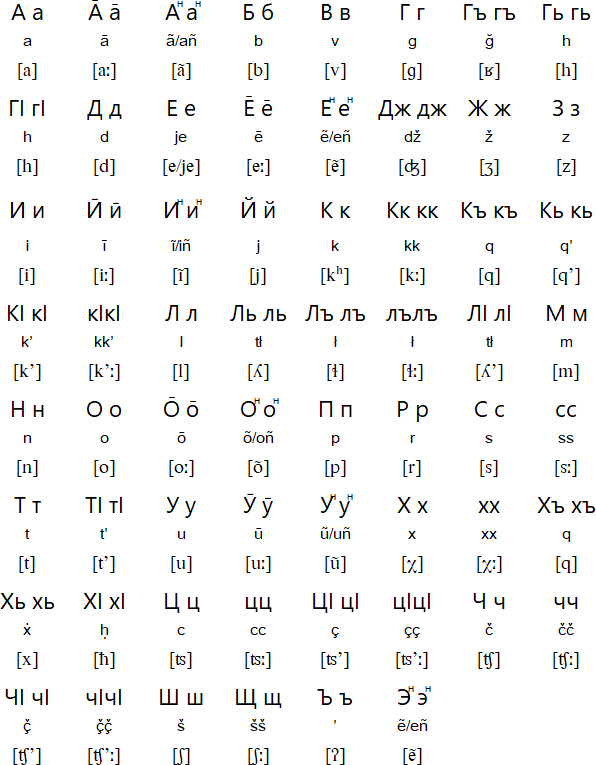Botlikh is a member of the Avar-Andic branch of Northeast Caucasian languages spoken in the villages of Botlikh (Ботлих), Miarso (Миарсо) and Ashino (Ашино) in the Botlikh region of western Dagestan in the southwest of the Russian Federation. According to the 2010 census, 206 people speak Botlikh, however it is thought that the number of speakers is actually about 8,000.
There are two main dialects: Botlikh and Miarso, which differ somewhat in pronunciation, vocabulary and grammar, however are mutually intelligible. It contains words borrowed from Arabic, Russian and Avar, and also some Turkish and Persian words, which probably came via Aver.
Botlikh is being passed on to children and is used in everyday communication, although not in the media or in education. It is rarely written and speakers of Botlikh generally use Avar or Russian as a literary language and in school. Some Botlikh families are shifting to Russian and the language is considered threatened.

Download an alphabet chart for Botlikh (Excel)
Details provided by Wolfram Siegel and Samira Verhees.
Ден ванъа вукIа бугъуйхоб каласалъи. Бугъуйхоб каласла булIо, ден вукIа ишхъе игьи нала гучIида. Цер зиуди ила йанъа йикIа базара. Базареку бай йессуха йишаб заманади галълъиди кьетIир гьибгъва санду. ГьечIиссе дий кьетIир гьушта идо букIичIа. Илуди гьуб кьетIир гьибгъва букIа дий чанчи. Гьуб кьетIирла ибча, ден мигъилъа ванъихо вукIа. Ишкур гьуб кьетIир гванзо чанчихаб букIа. Гьуб кьетIир дичIу бехутIу ругьунив. Гьулъий ишкур туканеру кампитабалъи хихаб букIа.
I was in the fourth grade. When I finished fourth grade, I was at home and I had nothing to do. One day my mother went to the bazaar. She came back from the bazaar with the lamb. I didn't like him at first. My mother bought a lamb to take care of it. I went to the garden with this lamb. I took good care of him. He's used to me. I treated him to candy from the store.
Source: https://sverhees.github.io/botlikh_khabar/lamb.html . From a folk story called "Денла диб кьетIирла (Me and My lamb)".
Sample text provided by Jin Wei Hii
Information about Botlikh | Numbers
Information about Botlikh language and people
http://en.wikipedia.org/wiki/Botlikh_language
https://ru.wikipedia.org/wiki/Ботлихский_язык
http://www.ethnologue.com/language/bph
http://www.eki.ee/books/redbook/botlikhs.shtml
https://minlang.iling-ran.ru/lang/botlikhskiy-yazyk
https://github.com/sverhees/site/blob/master/papers/botlikhgrammar_draft.pdf
Aghul, Akhvakh, Andi, Archi, Avar, Bagvalal, Batsbi, Bezhta, Botlikh, Budukh, Caucasian Albanian, Chamalal, Chechen, Dargwa, Godoberi, Hinukh, Hunzib, Ingush, Kaitag, Karata, Khinalug, Khwarshi, Kryts, Kubachi, Lak, Lezgian, Rutul, Tabassaran, Tindi, Tsakhur, Tsez, Udi
Abaza, Abkhaz, Adyghe, Aghul, Akhvakh, Akkala Sámi, Aleut, Altay, Alyutor, Andi, Archi, Assyrian / Neo-Assyrian, Avar, Azeri, Bagvalal, Balkar, Bashkir, Belarusian, Bezhta, Bosnian, Botlikh, Budukh, Bulgarian, Buryat, Chamalal, Chechen, Chelkan, Chukchi, Chulym, Chuvash, Crimean Tatar, Dargwa, Daur, Dolgan, Dungan, Enets, Erzya, Even, Evenki, Gagauz, Godoberi, Hinukh, Hunzib, Ingush, Interslavic, Itelmen, Juhuri, Kabardian, Kaitag, Kalderash Romani, Kalmyk, Karaim, Karakalpak, Karata, Karelian, Kazakh, Ket, Khakas, Khanty, Khinalug, Khorasani Turkic, Khwarshi, Kildin Sámi, Kili, Komi, Koryak, Krymchak, Kryts, Kubachi, Kumandy, Kumyk, Kurdish, Kyrgyz, Lak, Lezgi, Lingua Franca Nova, Lithuanian, Ludic, Macedonian, Mansi, Mari, Moksha, Moldovan, Mongolian, Montenegrin, Nanai, Negidal, Nenets, Nganasan, Nivkh, Nogai, Old Church Slavonic, Oroch, Orok, Ossetian, Pontic Greek, Romanian, Rushani, Russian, Rusyn, Rutul, Selkup, Serbian, Shor, Shughni, Siberian Tatar, Sirenik, Slovio, Soyot, Tabassaran, Tajik, Talysh, Tat, Tatar, Teleut, Ter Sámi, Tindi, Tofa, Tsakhur, Tsez, Turkmen, Tuvan, Ubykh, Udege, Udi, Udmurt, Ukrainian, Ulch, Urum, Uyghur, Uzbek, Veps, Votic, Wakhi, West Polesian, Xibe, Yaghnobi, Yakut, Yazghulami, Yukaghir (Northern / Tundra), Yukaghir (Southern / Kolyma), Yupik (Central Siberian)
Languages written with the Latin alphabet
Page last modified: 09.06.24
[top]
You can support this site by Buying Me A Coffee, and if you like what you see on this page, you can use the buttons below to share it with people you know.

If you like this site and find it useful, you can support it by making a donation via PayPal or Patreon, or by contributing in other ways. Omniglot is how I make my living.
Note: all links on this site to Amazon.com, Amazon.co.uk
and Amazon.fr
are affiliate links. This means I earn a commission if you click on any of them and buy something. So by clicking on these links you can help to support this site.
[top]